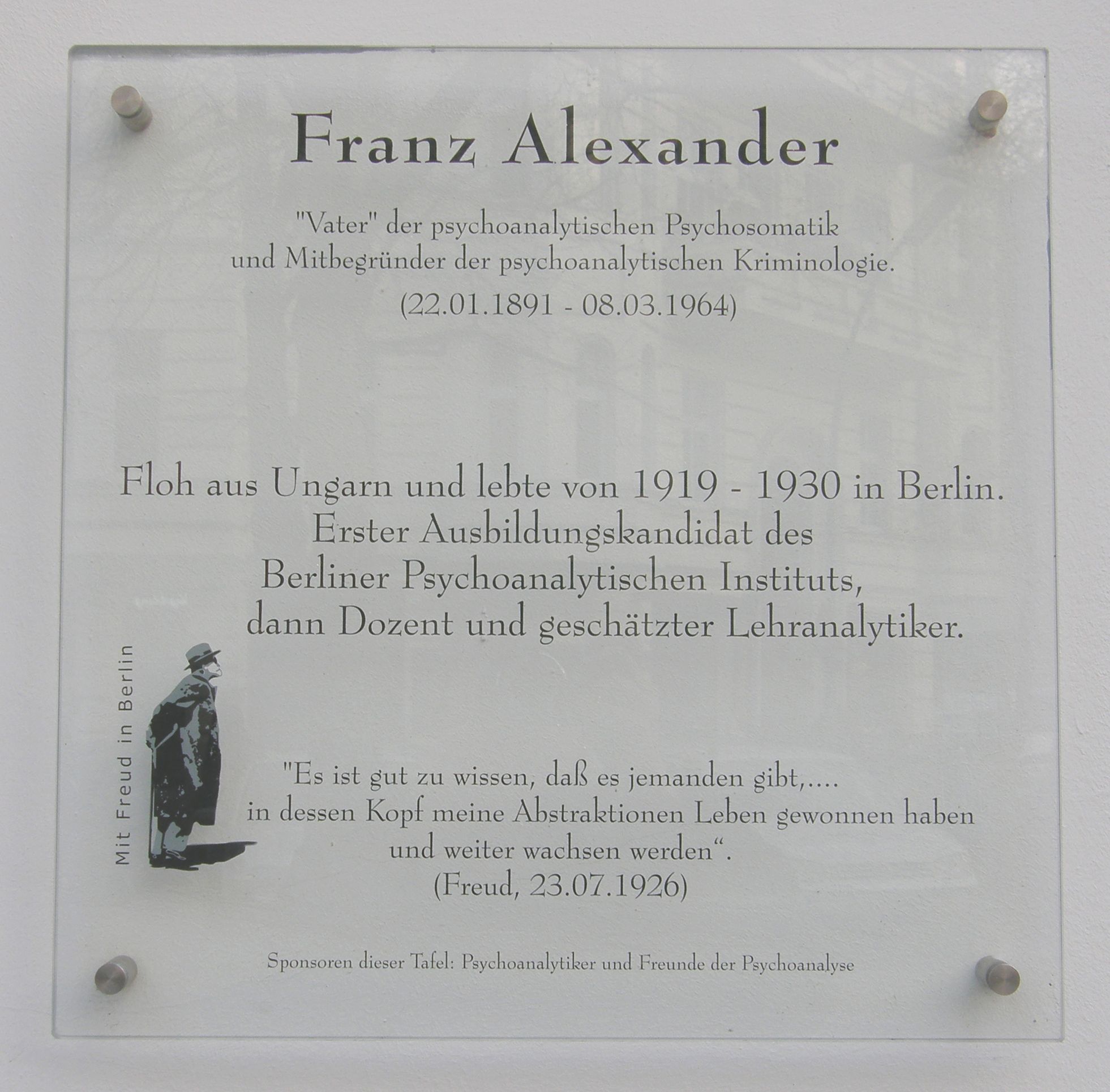[cite book | last = Asaad| first = Ghazi | title = Psychosomatic Disorders: Theoretical and Clinical Aspects| publisher = Brunner-Mazel|date=1996| pages = X, 129-130 | isbn = 978-0876308035] Sigmund Freud pursued a deep interest in psychosomatic illnesses following his correspondence with Georg Groddeck who was, at the time, researching the possibility of treating physical disorders through psychological processes. [cite book | last = Erwin| first = Edward | title = The Freud Encyclopedia: Theory, Therapy and Culture| publisher = Routledge|date=2002| pages = 245-246 | isbn = 978-0415936774] ]Together with Sigmund Freud and Sandor Ferenczi he developed the concept of autoplastic adaptation. They proposed that when an individual was presented with a stressful situation, he could react in one of two ways:
* Autoplastic adaptation: The subject tries to change himself, i.e. the internal environment.
* Alloplastic adaptation: The subject tries to change the situation, i.e. the external environment.
From the 1930s through the 1950s, numerous analysts were engaged with the question of how to shorten the course of therapy but still achieve therapeutic effectiveness. These included Sándor Ferenczi, Franz Alexander, Peter Sifneos, David Malan, and Habib Davanloo. One of the first discoveries was that the patients who tended to benefit the most greatly from therapy were those who could rapidly engage, could describe a specific therapeutic focus, and could quickly move to an experience of their previously warded-off feelings. These also happened to represent those patients who were the healthiest to begin with and therefore had the least need for the therapy being offered. Clinical research revealed that these patients were able to benefit because they were the least resistant. They were the least resistant because they were the least traumatised and therefore had the smallest burden of repressed emotion. However, among the patients coming to the clinic for various problems, the rapid responders represented only a small minority. What could be offered to those who represented the vast bulk of patients coming for treatment? See further Intensive short-term dynamic psychotherapy
Publications
* 1931, "The Criminal, the judge and the public: A psychological analysis". (Together with Hugo Staub. Orig. ed. transl. by Gregory Zilboorg).
* 1960, "The Western mind in transition : an eyewitness story". New York: Random House.
* 1961, "The Scope of psychoanalysis 1921 - 1961: selected papers". 2. pr. New York: Basic Books.
* 1966, "Psychoanalytic Pioneers". New York; London: Basic Books.
* 1968, "The history of psychiatry; An evaluation of psychiatric thought and practice from prehistoric times to the present". By Franz G. Alexander and Sheldon T. Selesnick. New York [etc.] : New American Libr.
* 1969 [c1935] (with William Healy) Roots of crime: psychoanalytic studies, Montclair NJ: Patterson Smith.
* 1980, "Psychoanalytic therapy. Principles and application". Franz Alexander and Thomas Morton French.
* 1984, "The medical value of psychoanalysis". New York: Internat. Universities Pr., 1984. ISBN 0-8236-3285-7.
* 1987, "Psychosomatic Medicine: Its Principles and Applications". 2nd. ed., New York; London: Norton. ISBN 0-393-70036-4.
References
Further reading
*Citation
id = PMID:14213975
url=
publication-date=1964
year=1964
title=Franz Alexander 1891-1964.
volume=24
issue=
periodical=American journal of psychoanalysis
pages=115
*Citation
id = PMID:14221041
url=
last=Benedek
first=T
publication-date=1964 Oct
year=1964
title=In Memorian Franz Alexander 1891-1964.
volume=12
issue=
periodical=Journal of the American Psychoanalytic Association
pages=877-81
*Citation
id = PMID:11490671
url=
last=Eckardt
first=M H
publication-date=2001
year=2001
title=Franz Alexander: a unique outstanding pioneer.
volume=29
issue=1
periodical=The Journal of the American Academy of Psychoanalysis
pages=105-11
*Citation
id = PMID:14157772
url=
last=French
first=T M
publication-date=
year=
title=Franz Alexander , M.D. 1891-1964.
volume=26
issue=
periodical=Psychosomatic medicine
pages=203-6
*Citation
id = PMID:4867714
url=
last=French
first=T M
publication-date=1964 Apr
year=1964
title=Franz Alexander (1891-1964).
volume=9
issue=2
periodical=Behavioral science
pages=98-100
*Citation
id = PMID:14333921
url=
last=Freyberger
first=H
publication-date=1964 Sep
year=1964
title= [Obituray of Franz Alexander , 1891-1964.]
volume=14
issue=
periodical=Zeitschrift für Psychotherapie und medizinische Psychologie
pages=169-70
*Citation
id = PMID:2684936
url=
last=Kopp
first=M
last2=Skrabski
first2=A
publication-date=1989 Nov
year=1989
title=What does the legacy of Hans Selye and Franz Alexander mean today? (The psychophysiological approach in medical practice).
volume=8
issue=2
periodical=International journal of psychophysiology : official journal of the International Organization of Psychophysiology
pages=99-105
*Citation
id = PMID:14341703
url=
last=McClean
first=H V
publication-date=1965 Apr
year=1965
title=Franz Alexander, 1891-1964.
volume=46
issue=
periodical=The International journal of psycho-analysis
pages=247-50
*Citation
id = PMID:14299014
url=
last=Pollock
first=G H
publication-date=1965 Apr
year=1965
title=In Memorian Franz Alexander : 1891-1964.
volume=1
issue=
periodical=International journal of psychiatry
pages=306-10
*Citation
id = PMID:14173116
url=
last=Pollock
first=G H
publication-date=1964 Sep
year=1964
title=Franz Alexander 1891-1964.
volume=11
issue=
periodical=Arch. Gen. Psychiatry
pages=229-34
External links
* http://www.mek.iif.hu/porta/szint/egyeb/lexikon/eletrajz/html/ABC00003/00174.htm
* [http://www.psychomedia.it/pm/modther/probpsiter/alexan-2.htm The corrective emotional experience (1946) (chapters 2, 4, and 17 of the book by Franz Alexander, Thomas M. French et al., Psychoanalytic Therapy: Principles and Application. New York: Ronald Press, 1946)] Franz Alexander

